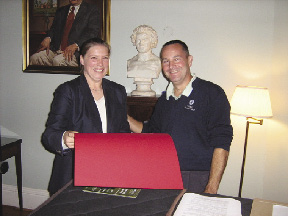The Connecticut Chapter of the Appraisal Institute has been honored to hand out certificates for the prestigious SRA and MAI designations to those who have completed the constringent requirements the past year. The following members have been granted designations in 2009:
A. Carl Boecherer, III, SRA
Gerald Fogarty, SRA
Kristin McLaughlin, MAI
Cristin Sheehy, SRA
Obtaining either the SRA (residential oriented appraisers) or the MAI (commercial oriented appraisers) involves achieving a number of requirements that include several years of actual experience, a serious of course work, completion of either a demonstration report or an alternative option if available, and the passing of a comprehensive exam.
The number of designees being granted the SRA designation has been increasing, as two years ago, the Appraisal Institute began offering two courses as an alternative to writing the demonstration report, which essentially is a time consuming theses on appraising one particular subject property. The courses, Advanced Residential Applications and Case Studies - Part 1 and Advanced Residential Report Writing - Part 2 meet current and future Appraisal Qualification Board standards (AQB). The first part is a case study analysis and the second part is actually completing eight writing assignments based on sections of a narrative appraisal report for the case study property analyzed in Part 1. The Appraisal Institute awards 15 hours of continuing education for Part 1 and 30 hours for Part II.
These courses are both typically pre-approved to also meet state licensing and certification continuing education requirements. Both courses are designed to provide an intense hands-on experience that allows an appraiser to walk through an in depth analysis not just to solve complex appraisal problems, such as functional inadequacy issues with a property, external obsolescence issues, or highest and best use alternatives, but also to clearly communicate the analysis in a narrative format. For residential appraisers who historically have just used form reports to communicate the appraisal analysis and conclusions, writing a narrative report can seem very overwhelming. The two courses are designed to remove that fear and to allow the appraiser to let the end user(s) understand not just the data collected to support the specific analysis, but also the conscientious effort that went into solving their appraisal problem. For additional information on becoming a member or obtaining a designation, please contact the Connecticut Chapter of the Appraisal Institute through our web site at www.ai-ct.org.
Tags:
Designations awarded by the Connecticut Chapter of the Appraisal Institute
November 17, 2009 - Connecticut









